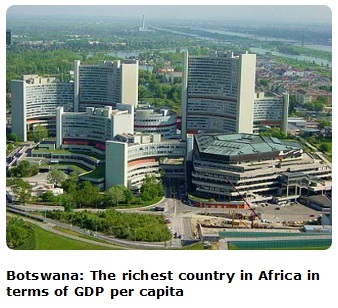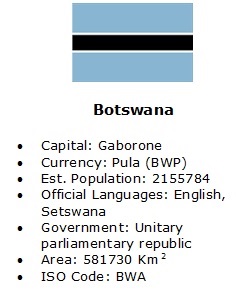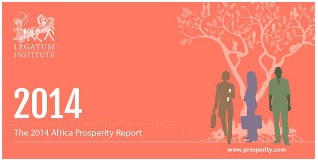 ReConnect Africa is a unique website and online magazine for the African professional in the Diaspora. Packed with
essential information about careers, business and jobs, ReConnect Africa keeps you connected to the best of Africa.
ReConnect Africa is a unique website and online magazine for the African professional in the Diaspora. Packed with
essential information about careers, business and jobs, ReConnect Africa keeps you connected to the best of Africa.



 The 2014 Africa Prosperity Report named Botswana the most prosperous country in Africa overall for the third year in a row
The 2014 Africa Prosperity Report named Botswana the most prosperous country in Africa overall for the third year in a row
The 2014 Africa Prosperity Report ranked 38 countries in terms of prosperity — defined as wealth and well-being. The report measures GDP and eight sub-indices such as education, health, and personal freedom. It confirms success across the continent in terms of Economy and Entrepreneurship and Opportunity. It reveals, however, serious problems in Health, Education, Gender gap and Safety & Security.
Botswana was ranked the richest country on the continent in terms of GDP per capita ($15,176) and scored well in the Governance, Education and Personal Freedom Indices. The Central African Republic ($584 per capita) was the lowest ranked country on the continent. Eastern Africa emerged as the region with the largest increase in prosperity in the past three years.
Nathan Gamester, Programme Director of the Legatum Prosperity Index™, says, “Prosperity is not just about having a strong economy; it is about having great education, healthcare, and freedom to choose among other things. As African economies grow, a chief concern for many governments is how to ensure that the fruits of growth benefit a majority of the population and contribute to true long term prosperity.”
The Africa Prosperity Report
Poor infrastructure, weak governance, unfriendly business climates, inadequate healthcare, and safety and security concerns are some of the challenges mentioned that may hinder long term development and prosperity.
Some have used these challenges to question, with good reason, the “Africa Rising” narrative that has dominated much of the comment and analysis about the continent in recent years. What these challenges reveal is that this narrative has been constructed predominantly on the basis of economic growth while ignoring many other vital foundations of prosperity.
The Africa Prosperity Report provides a comprehensive view of what’s happening in Africa beyond traditional economic indicators. It considers a broad set of indicators that tell us not only how nations perform economically but in vital areas such as education, governance, heath, safety and security, and more.
The report is published by the Legatum Institute, a charitable public policy think-tank. The majority of data and analysis is drawn from the flagship Legatum Prosperity Index™, which explores the foundations of prosperity in 142 countries around the world.
The Africa Prosperity Report shows that African nations have made progress over the last three years. In particular, African nations are performing well in the Personal Freedom, Economy and Entrepreneurship & Opportunity sub-indices.
Serious weaknesses persist, however, in the areas of Education, Health, and Safety & Security. There is however, some cause for optimism as the Prosperity Index shows that since 2012, six out of the top 10 most-improved countries in the world on the Health sub-index are in Africa.
 |
| Click here to see the Country Profile |
The poor performance in measures of education is a major impediment to Africa’s future growth. The correlation between education and employment is well known and failing to provide future generations with the right skills will result in large inequalities and reduced economic growth. The safety and security challenges still dominate the landscape of many African nations and the Africa Prosperity Report reveals not only that many African countries perform very poorly in this area but that they are getting worse.
Strong economic performance in recent years suggests that many African nations are on the right track. However, with a large part of the population living on less than two dollars a day, most Africans don’t appear to be benefiting from the current economic boom. African leaders need to empower disadvantaged groups such as women, the youth, and the poor to enable them to engage economically and to be a part of Africa’s growth.
This report examines in detail three distinct groups of people who are often identified as drivers of African prosperity. They are: the well-educated; female entrepreneurs; and the middle class.
A Critical Role for Education
Starting with education, it is widely recognised that education plays a critical role in empowering people and increasing the potential for citizens to contribute economically and politically. While African governments spend a relatively high share of GDP on education, the outcomes are disappointing. Increasing enrolment rates is an important goal for improving Africa’s future but there must also be a focus on the quality of education, particularly that which teaches useful employment skills.
These issues are discussed in the first chapter by examining firstly the education system in Tanzania followed by two case studies that explore how technology and indigenous knowledge might support and foster education improvement and prosperity.
As demonstrated by a vast body of literature, entrepreneurship is critical for growth and prosperity. However, African nations are not realising their potential since a large proportion of human capital is under-used. Across the continent, women’s contributions to business need to be unlocked in order to release female human capital that could revolutionise the African labour market and the wider business environment. Female entrepreneurs are constrained by a variety of factors including social prejudice, poor access to education, limited access to finance, and exclusion from business networks.
The second chapter explores the gender imbalance in African entrepreneurship caused by the many impediments that prevent women from becoming entrepreneurs. This chapter also includes two case studies that analyse the impact of the Arab Spring on female business activities in Egypt as well as the state of Rwanda’s business environment for women.
Finally, the report considers the middle class, which, as a group, is considered worldwide to be a driver of prosperity. Although the precise definition of the middle class in Africa remains an ongoing discussion, one thing is clear: its number has increased sharply in recent years due to the fast pace of economic growth. The private sector’s expansion has been critical in supporting the middle class’ emergence since they tend to be entrepreneurs or employed in stable jobs. The link between the middle class and prosperity is not, however, limited to monetary issues. As discussed in the third chapter and in particular in Professor Ncube’s special feature, the middle class, by asking for more accountability and transparency from governments, better education, and a more business-friendly Finally, environment, is an emerging new social group with its own features that could play a vital role in shaping the continent’s future prosperity.
With a large part of the population living on less than two dollars a day, “Africa rising” is not a reality for most Africans. By supporting education quality, female entrepreneurship, and the rising middle class, African countries could avoid a future where inequality and chronic poverty persist in the midst of wealth and prosperity. In turn, this will empower disadvantaged groups that have been left out of the current economic boom, raising personal and national wellbeing.
The Arab Spring: A setback for women, tolerance, and personal freedom?
The Arab Spring has not promoted prosperity in North Africa. North African countries are in the bottom third for Personal Freedom—which has decreased over the past two years. Egypt is ranked last (38th) in the Personal Freedom sub-index for the past three years. The country also shows the lowest tolerance for immigrants (40%) and minorities (20%) in Africa in 2014.
 Women are worse off in the wake of the Arab Spring. The gender gap in business ownership increased by 11% from 2010 to 2013. More women perceive corruption in business (+12%); less women feel safe walking at night (-37) and fewer than ever feel satisfied with the freedom of choice in their life (-5%).
Women are worse off in the wake of the Arab Spring. The gender gap in business ownership increased by 11% from 2010 to 2013. More women perceive corruption in business (+12%); less women feel safe walking at night (-37) and fewer than ever feel satisfied with the freedom of choice in their life (-5%).
Solène Dengler, Research Analyst in the Prosperity Index team states, “By supporting education quality, female entrepreneurship, and the rising middle class, African countries could avoid a future where inequality and chronic poverty persist alongside wealth and prosperity. In turn, this will empower disadvantaged groups that have been left out of the current economic boom, raising personal and national wellbeing.”
African Women Still Facing Gender Gap
Only 8% of women, as opposed to 18% of men, are in full time employment. 41% of women are out of work, as opposed to 23% of men. 22% of women currently own a business—though these are overwhelmingly small and micro enterprises.
Novella Bottini, Econometrician in the Prosperity Index team states, “With regards to entrepreneurship, despite efforts to promote business across Africa, women are often left out. Initiatives that support women empowerment and a more active participation in business will be key for future prosperity through increased economic activity, and larger investments in health and education of their families and communities.”
Video:
https://www.youtube.com/watch?feature=player_embedded&v=5BDjMtnxj5I
http://www.li.com/activities/publications/2014-africa-prosperity-report
